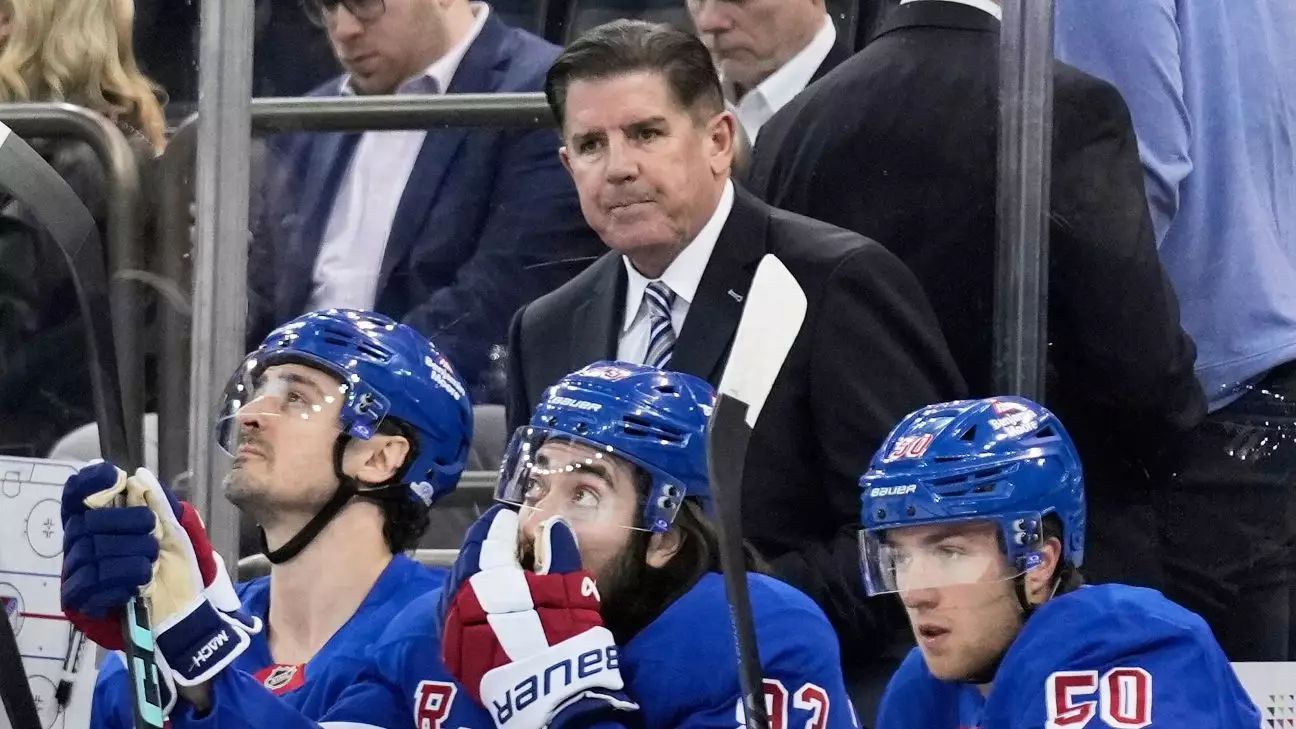The New York Rangers have officially descended into chaos with the firing of Peter Laviolette, the latest casualty in a seemingly endless search for stability. Laviolette’s termination, just days after a disappointing season conclusion, underscores a troubling trend within the organization—a recurrent inability to find the right leadership to guide a team with immense potential. While Laviolette entered the season with the promise of building on last year’s Eastern Conference finals run, the latter part of the season revealed cracks in the foundation, leading to a predictable yet disappointing end.
The Rangers’ decision to cut ties with Laviolette marks a continuation of a coaching carousel that has seen the likes of David Quinn and Gerard Gallant make brief stops in New York before being shown the door. While each coach brought a unique vision, the organization’s failure to cultivate any continuity in strategy raises serious questions about its management approach. The Rangers aren’t just changing coaches; they are discarding entire philosophies on how to build a successful team.
Short-Sighted Trades Spark Turmoil
An alarming aspect of the Rangers’ recent struggles has been their inconsistent roster management. The club’s move to trade captain Jacob Trouba, a foundational piece with leadership qualities, sent shockwaves throughout the fanbase. Following this, they parted ways with Kaapo Kakko, once heralded as a blue-chip prospect. Such radical changes indicate a management team more focused on momentary fixes than developing a long-term strategy grounded in player cohesion and team identity.
This trend culminated in the sparkling miscalculation made as they approached the trade deadline, frantically reshuffling players to attain a playoff push. These moves, including reacquiring J.T. Miller and bringing in Carson Soucy, fundamentally altered the team structure without providing the much-needed stability. Trading experienced players like Ryan Lindgren and Reilly Smith, who contributed to the locker room dynamic, was a reckless gamble that only amplified the team’s underlying problems.
The Illusion of Expectations
Entering the season, the Rangers were widely regarded as serious contenders for the Stanley Cup. Riding the momentum of their previous season and a strong start, it’s no surprise that passionate fans and analysts alike projected high hopes for the franchise. However, the illusion of a powerhouse quickly shattered as the team spiraled into a lack of cohesion and consistency halfway through the season.
The initial success obscured deeper issues that were steadily unfurling. After a robust start with 12 wins out of 17 games, the five straight losses that followed illustrated a vulnerability that was merely glossed over by early season enthusiasm. This trend of quick ascent followed by an abrupt decline has become a painful hallmark of recent Rangers’ seasons, leaving fans wondering when their team will finally find the consistency it desperately seeks.
Searching for Answers in a Competitive Landscape
In the wake of Laviolette’s dismissal, Rangers’ management faces a daunting task. The clear need for a new leader raises questions about who will step into the fray amidst the uncertainty. Names like John Tortorella and Joel Quenneville have surfaced, but each comes with their own baggage and challenges. They are seasoned coaches, yes, but will they push the franchise in the right direction or merely offer more of the same?
Moreover, the Rangers aren’t navigating a vacant coaching landscape. The NHL has become an increasingly competitive environment, and other teams, including the Ducks and the Bruins, are also on the hunt for fresh perspectives. Management’s instinct to seek outside expertise should yield innovative and revolutionary approaches, but if history has shown anything, it’s that past coaching hires have often failed to deliver the desired results.
In a league filled with heavy hitters, the status of the Rangers hangs precariously in limbo—a web of management missteps, hasty trades, and an utter lack of identity will either lead them into oblivion or be an opening for a rebirth. It’s time for the Rangers to commit fully to a teenager’s wisdom: consistency is key. Until they address the foundational challenges at hand, this coaching change will likely be a futile reset in a cycle of repeated failures.


Leave a Reply